|
|
|
Sort Order |
|
|
|
Items / Page
|
|
|
|
|
|
|
| Srl | Item |
| 1 |
ID:
157085
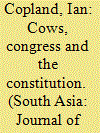

|
|
|
|
|
| Summary/Abstract |
Added late to the draft Indian Constitution, Article 48 specifically mandated the Indian state to criminalise the killing of cows, a provision that, as well as being arguably at odds with at least three of the document's Directive Principles, was implicitly anti-Muslim. The provision was adopted, almost without demur, by a Constituent Assembly dominated by the Congress at a time when discrimination against the Indian Muslim minority in other fields was rife. With hindsight, the making of Article 48 can be seen as the first victory in post-colonial India of the nascent Hindu Right, preceding as it did even the formation of the country's first effective Hindu political party, the Bharatiya Jana Sangh. This paper investigates how, and why, the cause of cow protection came to be supported (and effectively sponsored) in the Assembly by senior members of a supposedly secular Congress parliamentary caucus headed by staunch anti-communalist, agnostic and Muslim sympathiser, Prime Minister Jawaharlal Nehru.
|
|
|
|
|
|
|
|
|
|
|
|
|
|
|
|
| 2 |
ID:
047013
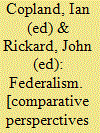

|
|
|
|
|
| Publication |
New Delhi, Manohar Publishersand Distributors, 1999.
|
| Description |
299p.
|
| Standard Number |
817304239X
|
|
|
|
|
|
|
|
|
|
|
|
Copies: C:1/I:0,R:0,Q:0
Circulation
| Accession# | Call# | Current Location | Status | Policy | Location |
| 044511 | 321.02/COP 044511 | Main | On Shelf | General | |
|
|
|
|
| 3 |
ID:
075970
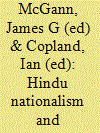

|
|
|
|
|
| Publication |
Oxford, Oxford Univeristy press, 2007.
|
| Description |
vi, 476p.
|
| Standard Number |
0195679229
|
|
|
|
|
|
|
|
|
|
|
|
Copies: C:1/I:0,R:0,Q:0
Circulation
| Accession# | Call# | Current Location | Status | Policy | Location |
| 052196 | 324.254/MCG 052196 | Main | On Shelf | General | |
|
|
|
|
| 4 |
ID:
114662
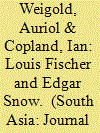

|
|
|
|
|
| Publication |
2012.
|
| Summary/Abstract |
In the absence of direct diplomatic links with India because it was part of the British Empire, President Roosevelt of the United States found means to monitor the political situation there when the Cripps Mission to India of March-April 1942, which offered a small measure of reform, ended in failure as predicted. His 'emissaries' in India, Louis Fischer and Edgar Snow amongst others, uncovered a very different version of the failure of the Cripps Mission. Their articles, published from September 1942 onwards, let their American readers and Churchill's information bureaux know that British propaganda had been shown up for what it really was-a bid to retain British control of India.
|
|
|
|
|
|
|
|
|
|
|
|
|
|
|
|
| 5 |
ID:
000559
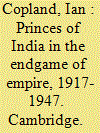

|
|
|
|
|
| Publication |
Cambridge, Univ. Pr., 1997.
|
| Description |
xiii, 302p.hbk
|
| Standard Number |
0521571790
|
|
|
|
|
|
|
|
|
|
|
|
Copies: C:1/I:0,R:0,Q:0
Circulation
| Accession# | Call# | Current Location | Status | Policy | Location |
| 041948 | 954.03/COP 041948 | Main | On Shelf | General | |
|
|
|
|
| 6 |
ID:
094015
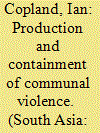

|
|
|
|
|
| Publication |
2010.
|
| Summary/Abstract |
Indian nationalists embraced the Partition of the subcontinent in 1947 in part because it appeared to offer a solution to the intractable 'communal problem' that had plagued the last three-quarters of a century of British rule; and at first the surgery of Partition seemed to make a difference. The incidence of overt 'communalism', in the shape of inter-ethnic collective violence between groups self-identified as 'Hindus' and 'Muslims', fell sharply after 1947 and remained low throughout the 1950s and early 1960s. But the remission did not last. Seventy-five significant communal incidents were recorded in 1955. The annual figure for 1965 was 173, for 1975 it was 205 and for 1985, 525.1 After a relative lull in the late 1980s, there was a further escalation in the last years of the twentieth century and in the first quinquennium of the twenty-first during which over 3,000 people were killed in the post-Ayodhya riots of 1992-93 and at least 1000 in the Gujarat pogrom of 2002. The level of communal violence in India today is greater, by a good margin, than it was in the late colonial era, and riots afflict far more of the country. No less than a quarter of India's 450 districts are now classified by the Home Ministry as 'hypersensitive'.
|
|
|
|
|
|
|
|
|
|
|
|
|
|
|
|
| 7 |
ID:
062212
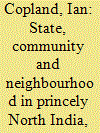

|
|
|
|
|
| Publication |
Houndmills, Palgrave Macmillan, 2005.
|
| Description |
xiii, 259p.
|
| Standard Number |
1403947074
|
|
|
|
|
|
|
|
|
|
|
|
Copies: C:1/I:0,R:0,Q:0
Circulation
| Accession# | Call# | Current Location | Status | Policy | Location |
| 049666 | 305.6095409041/COP 049666 | Main | On Shelf | General | |
|
|
|
|
|
|
|
|
|